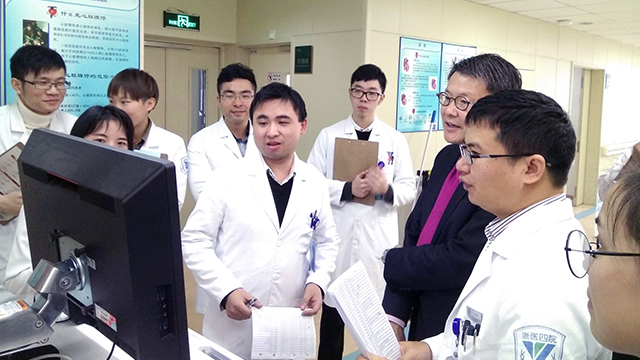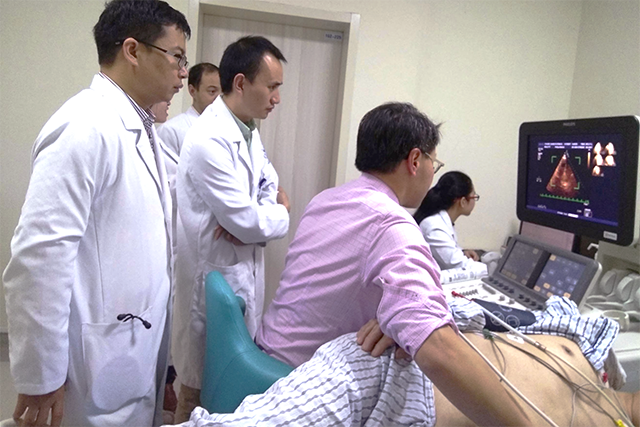
Jonathan Choy (dressed in suit) explains the results of the stress echocardiogram to the Zhejiang cardiology team.
New cardiology techniques performed with the guidance of UAlberta experts could potentially improve diagnosis and health outcomes for local patients in Zhejiang, China.
On November 15, 2017 the Fourth Affiliated Hospital of Zhejiang University Medical School performed the first-ever contrast stress echocardiograms in Zhejiang in collaboration with cardiologist Jonathan Choy, U of A Faculty of Medicine & Dentistry's Associate Dean, Clinical Faculty.
This procedure was a result of one of the several partnerships the University of Alberta maintains with top universities around the world.
While ultrasound contrast is commonly used in China to monitor or diagnose liver tumours, it is rarely used for cardiac ultrasound. Stress echocardiograms are not performed due to lack of expertise.
Choy explained that current medical literature supports a normal stress echo test offering excellent prognosis, avoiding the need for more expensive and invasive tests that come with potential side effects or complications.
The stress echo was performed on two patients to assess their risk of heart disease, working with the local cardiology and ultrasound physicians. With the results, they were able to avoid what would have been unnecessary procedures for these patients-such as a coronary angiogram or stent, a tube-shaped device inserted in the arteries to keep them open.

Choy performs a contrast stress echo with Zhejiang cardiologists Shudong Xia and Chao Feng.
The procedure offers an alternative opportunity for this medical centre to offer high-quality, non-invasive risk stratification (a process to identify and predict the level of risk of each patient to better manage their treatment). This university hospital located in the city of Yiwu serves a population with a growing patient volume in cardiac diseases. In China there is basic medical insurance coverage but patients often have to pay a portion of the costs of more expensive therapies, making the stress echo an affordable solution for many.
"Echocardiography is fast, cheap, widely available, and non-invasive, with no radiation or risk of contrast nephropathy," explained Choy, who has been performing stress echocardiography for 10 years. "It is portable and can be performed at the bedside of patients with reduced mobility. Furthermore, it offers information on cardiac valves, cardiac function, ischemia, and in certain cases with the use of contrast with dobutamine, myocardial viability."
The Faculty of Medicine & Dentistry has sustainable partnership programs with several higher education institutions worldwide, including East Africa, Latin America, the Caribbean, Nepal and Australia, among others. The U of A reaches top talents and shapes academic programming and leadership training around the world in areas such as cardiology, surgery, psychiatry, neurology and family medicine. According to Renny Khan, Director of International Programs at the FoMD, the input and expertise of U of A faculty, clinicians and administrative leaders help shape the programming and skill set of potentially leading health centres globally.
"We would like to recognize the high level of support received from Dean Richard Fedorak and the Faculty of Medicine & Dentistry to be able to deliver these partnerships, which help build the reputation of our faculty while they impact the improvement of health outcomes around the world," said Khan.